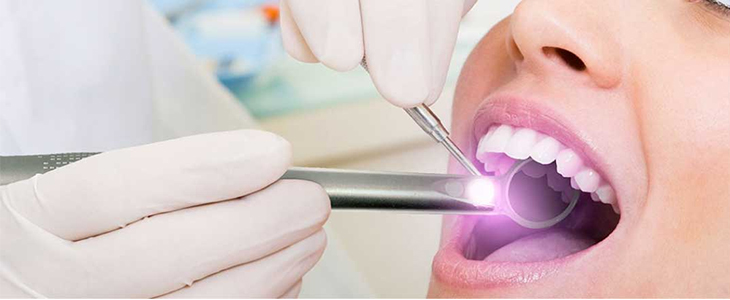9:30 am to 1:30 pm
5:00 pm to 9:00 pm (Mon - Sat)
10 am to 1 pm (Sunday)
SERVICE DETAILS
Oral Cancer Treatment

Oral Cancer Treatment
Signs and symptoms of mouth cancer may include:
A lip or mouth sore that doesn't heal.
A white or reddish patch on the inside of your mouth.
Loose teeth.
A growth or lump inside your mouth.
Mouth pain.
Ear pain.
Difficult or painful swallowing.
When to see a doctor
Make an appointment with your doctor or dentist if you have any persistent signs and symptoms that bother you and last more than two weeks. Your doctor will likely investigate other more common causes for your signs and symptoms first, such as an infection.
Risk factors
Factors that can increase your risk of mouth cancer include:
Tobacco use of any kind, including cigarettes, cigars, pipes, chewing tobacco and snuff, among others
Heavy alcohol use
Excessive sun exposure to your lips
A sexually transmitted virus called human papillomavirus (HPV)
A weakened immune system
Prevention
There's no proven way to prevent mouth cancer. However, you can reduce your risk of mouth cancer if you:
Stop using tobacco or don't start. If you use tobacco, stop. If you don't use tobacco, don't start. Using tobacco, whether smoked or chewed, exposes the cells in your mouth to dangerous cancer-causing chemicals.
Drink alcohol only in moderation, if at all. Chronic excessive alcohol use can irritate the cells in your mouth, making them vulnerable to mouth cancer. If you choose to drink alcohol, do so in moderation. For healthy adults, that means up to one drink a day for women of all ages and men older than age 65, and up to two drinks a day for men age 65 and younger.
Avoid excessive sun exposure to your lips. Protect the skin on your lips from the sun by staying in the shade when possible. Wear a broad-brimmed hat that effectively shades your entire face, including your mouth. Apply a sunscreen lip product as part of your routine sun protection regimen.
See your dentist regularly. As part of a routine dental exam, ask your dentist to inspect your entire mouth for abnormal areas that may indicate mouth cancer or precancerous changes. If any sharp tooth which causing constant irritation or ulcer is need to be removed or necessary treatment as per advise.
Diagnosis
Tests and procedures used to diagnose mouth cancer include:
Physical exam. Your doctor or dentist will examine your lips and mouth to look for abnormalities — areas of irritation, such as sores and white patches (leukoplakia).
Removal of tissue for testing (biopsy). If a suspicious area is found, your doctor or dentist may remove a sample of cells for laboratory testing in a procedure called a biopsy. The doctor might use a cutting tool to cut away a sample of tissue or use a needle to remove a sample. In the laboratory, the cells are analyzed for cancer or precancerous changes that indicate a risk of future cancer.
Imaging tests. A variety of imaging tests may help determine whether cancer has spread beyond your mouth. Imaging tests may include X-ray, CT, MRI and positron emission tomography (PET) scans, among others.
Treatment
Treatment for mouth cancer depends on your cancer's location and stage, as well as your overall health and personal preferences. You may have just one type of treatment, or you may undergo a combination of cancer treatments. Treatment options include surgery, radiation and chemotherapy. Discuss your options with your doctor.
Surgery
Surgery for mouth cancer may include:
Surgery to remove the tumor. Your surgeon may cut away the tumor and a margin of healthy tissue that surrounds it to ensure all of the cancer cells have been removed. Smaller cancers may be removed through minor surgery. Larger tumors may require more-extensive procedures. For instance, removing a larger tumor may involve removing a section of your jawbone or a portion of your tongue.
Surgery to remove cancer that has spread to the neck. If cancer cells have spread to the lymph nodes in your neck or if there's a high risk that this has happened based on the size or depth of your cancer, your surgeon may recommend a procedure to remove lymph nodes and related tissue in your neck (neck dissection). Neck dissection removes any cancer cells that may have spread to your lymph nodes. It's also useful for determining whether you will need additional treatment after surgery.
Surgery to reconstruct the mouth. After an operation to remove your cancer, your surgeon may recommend reconstructive surgery to rebuild your mouth to help you regain the ability to talk and eat. Your surgeon may transplant grafts of skin, muscle or bone from other parts of your body to reconstruct your mouth. Dental implants also may be used to replace your natural teeth.
Microvascular reconstructive surgery
Microvascular flap surgery rebuilds damaged tissue by transplanting healthy tissue from another part of your body. During flap surgery, small blood vessels at the donor and recipient tissue are sewn together. This isn't the same as a skin graft, since a “flap” is tissue, which includes more than just skin.
Immunotherapy uses your immune system to fight cancer. Your body's disease-fighting immune system may not attack your cancer because the cancer cells produce proteins that blind the immune system cells. Immunotherapy works by interfering with that process.
Immunotherapy treatments are generally reserved for people with advanced mouth cancer that's not responding to standard treatments.
